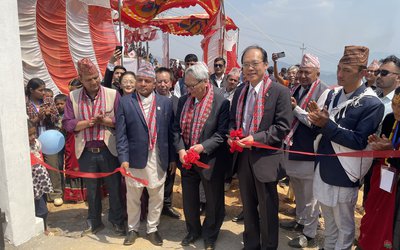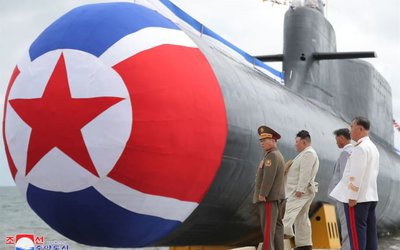For the Nepalese private sector players, who have been championing Nepal’s hydropower export to India as a panacea for prosperity and development, the newly announced India’s Guidelines on Cross Border Trade of Electricity is shocking as it has placed many conditions for private sector, making it difficult to export electricity to India.
However, the guidelines open a great opportunity to Nepal’s public sector enterprises such as Nepal Electricity Authority (NEA) to enhance their capability and invest more on the projects aiming to export energy to Indian market. Similarly, NEA also can import electricity from different Indian buyers. As the guidelines favor Indian companies, this will also encourage many Indian companies to invest in Nepal’s hydropower sector.
Indian Power Ministry issued the guidelines to facilitate the cross-border trade of electricity. According to the guidelines, the Central Electricity Regulatory Commission will frame appropriate regulations binding on all participating entities.
Rupa Devi Singh, former managing director and chief executive officer of Power Exchange India, said the guidelines were a watershed development towards the creation of a regional market in electricity.
According to the guidelines, a participating entity will be eligible for cross-border trading on Indian power exchanges, including Indian Energy Exchange and Power Exchange India, in term-ahead contracts, intra-day contracts and contingency contracts.
The interconnection between India and its neighboring countries will be planned jointly by transmission planning agencies with the approval of the respective governments. Further, tariffs for import of electricity by Indian entities, including traders, distribution licensees from generating stations directly, and traders located outside India, will be determined through competitive bidding.
According to the website of Indian Power Ministry, at present, cross-border trade of electricity takes place with Bangladesh, Bhutan and Nepal under bilateral memorandum of understanding (MoU) or Power Trade Agreement (PTA).
The SAARC Framework Agreement for Energy Cooperation (Electricity) was signed on November 27, 2014 and Indian government claims that this is based on SAARC spirit.
The United States Agency for International Development (USAID), in a recent study, estimated the annual cross-border electricity trade potential in the region to be 11-31 billion units in 2015-2020, which could rise to 330 billion units by 2034.
Although the directives restrict third-country investors aiming at Indian market, the provisions are blessings in disguise for Nepal’s power sector. As the guidelines restrict foreign investors, the power-starved Nepalese market will be a priority for them. Given the growing population and industrialization, there will be an increase in the domestic energy demand in the coming years.
These guidelines will directly benefit two Indian companies, easing the work for hydropower projects, 900MW Upper Karnali, which is being developed by GMR Energy, and 900MW Arun-3, being built by India’s state-owned Satluj Jal Vidyut Nigam. They are expected to export surplus power to the southern neighbor after they are completed.
The guidelines say that Nepal-based companies cannot directly export energy to India. According to the guidelines wholly owned by the Indian government or the public sector, or private companies with 51 percent or more Indian stake would be eligible to export power to India.
Many domestic and foreign hydropower companies had shown interest to build hydroelectricity projects in Nepal after the two countries signed the cross-border Power Trade Agreement (PTA) in October 2014.
However, companies owned or controlled by Nepali government will be allowed to sell power in India upon getting one-time approval from Indian authorities, according to the new rules. This makes state-owned Nepal Electricity Authority (NEA) and other projects owned or controlled by the government eligible to export power to India.
Indian Power Ministry claims that one of the aims of the Guidelines on Cross Border Trade of Electricity is to facilitate and promote cross border trade of electricity with greater transparency, consistency and predictability in regulatory approaches across jurisdictions and minimize perception of regulatory risks.
"A strong South Asian power market will be a great thing for all the nations in the region,'' said RV Shahi, former Union power secretary.
Rajesh Mediratta, director (business development), Indian Energy Exchange, said power exchanges had been allowed to facilitate all electricity transactions except in the day-ahead market.
''We expect such restrictions will be removed shortly to create a market of free-flowing electricity with hydro-rich neighbors, including Nepal and Bhutan, and power-deficit Bangladesh and Myanmar,'' he added.
According to the guidelines, the Central Electricity Regulatory Commission (CERC) of India shall frame the appropriate regulation for facilitating the cross border trade of electricity with neighboring countries in accordance with the guidelines.
Despite so many shortcomings, the guidelines open the regional energy market where energy is regarded as a trading community. This is a big achievement for the regional energy trade.
Some see this is blessing in disguise for Nepal’s power sector as well. After the new guidelines, power starved Nepalese market will be a priority for foreign investors. Given the growing population and industrialization, there will be an increase in demands of energy many times in the coming year in Nepalese market.
The regulation is bane for those who are preaching for energy trade with India as panacea for overall economic development of Nepal. However, it is a boon for Nepalese who are pleading to develop hydropower sector for Nepal’s own consumption and industrialization.
Highlights of Regulations
Considering that electricity trade shall be involving issues of strategic, national and economic importance, participating entities (Participating Entity(ies)) complying with following conditions shall be eligible to participate in cross border trade of electricity after obtaining one-time approval from the Designated Authority: (a) Import of electricity by Indian entities from Generation projects located outside India and owned or funded by Government of India or by Indian Public Sector Units or by private companies with 51% or more Indian entity (entities) ownership;
Import of electricity by Indian entities from projects having 100% equity by Indian entity and/ or the Government / Government owned or controlled company(ies) of neighboring country.
Import of electricity by Indian entities from licensed traders of neighboring countries having more than 51% Indian entity(ies) ownership.
Export of electricity by distribution licensees / Public Sector Undertakings (PSUs), if surplus capacity is available and certified by the concerned distribution licensee or the PSU as the case may be.
Any other participating entity shall be eligible to participate in cross border trade of electricity after obtaining approval of the Designated Authority on case to case basis.
Any change in the equity pattern of the participating entities after the date of approval shall be duly intimated to Designated Authority and fresh approval shall be obtained by the participating entities under para 5.2.1 and 5.2.2 above.
Any coal based Indian thermal power projects other than Public Sector Undertakings shall be eligible for export of electricity to neighboring countries only if surplus capacity is certified by the Designated Authority.
Ministry of Power may also identify the sources from which power can be exported to neighboring countries.
The Project Developer of the neighboring countries participating under cross-border trade shall submit the technical information to the Central Electricity Authority (CEA). Also, if required by the Designated Authority, the developer shall submit the commercial and financial information to the Central Electricity Authority.
TARIFF
Cross border transaction of electricity through Government to Government negotiations Where import/ export of electricity is agreed between the Government of India and the Government of neighboring country involving the participating entities of the two countries, the tariff for such transaction shall be determined through Government to Government negotiations, which shall be adopted by the Appropriate Commission.
Provided that tariff of participating entity of the neighboring country already determined through Government to Government negotiations shall continue to be determined through Government to Government negotiations.
The guideline has made it clear that cross border transaction of electricity can be made only through arrangements between the Government to Government negotiations.
Tariff for import of electricity by Indian entities (including traders, distribution licensees) from generating stations (directly or through trader) located outside India may be determined, under long term/ medium term/ short term agreement, through a process of competitive bidding, which shall be adopted by the Appropriate Commission under Section 63 of the Electricity Act, 2003.
Provided that in case of hydro projects, the tariff may be determined by the Central Electricity Regulatory Commission as per its Regulations, if approached by the generator through the Government of the neighboring country and agreed by the Indian entities, including Public Utilities/ Discom(s).
Tariff for export of electricity to entities of neighboring countries by Indian entities through long term/ medium term/ short term agreements may be as mutually agreed or through competitive bidding, subject to payment of the charges as applicable for transmission / wheeling of electricity through the Indian grid.

Keshab Poudel
Poudel is the editor of New Spotlight Magazine.
- CLA: Samriddhi For Skill Development
- Apr 23, 2024
- ECONOMY: Growth At 3.3
- Apr 16, 2024
- DPM’s SHRESTHA’S CHINA VISIT High Profile, Low Key
- Apr 14, 2024
- Maha Kumbha In Barahkshetra: A Sacred Festival In Sacred Koshi (Kaushiki) River
- Apr 09, 2024
- LOSS AND DAMAGE: Upper Tamakoshi A Case
- Apr 02, 2024
















